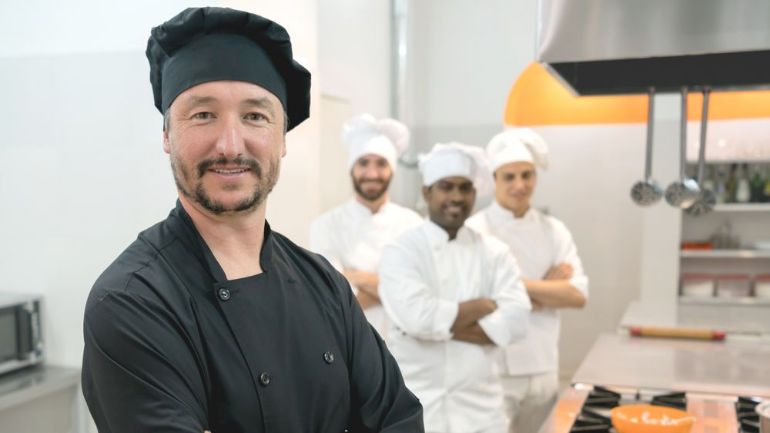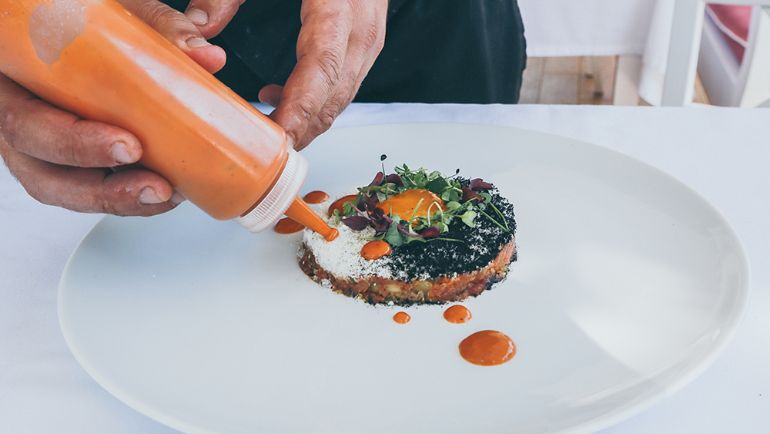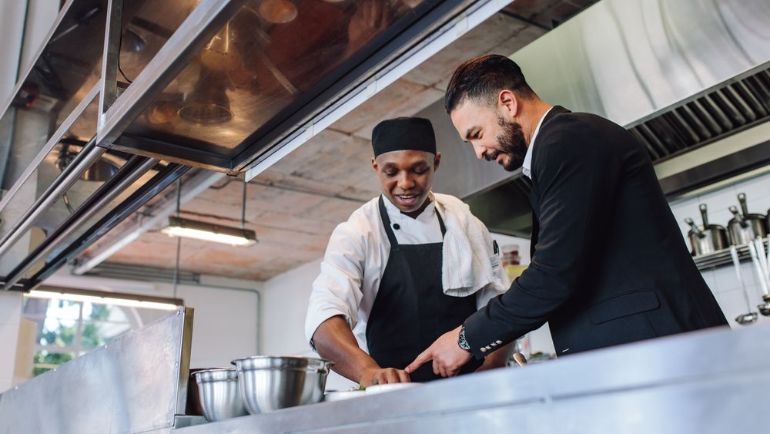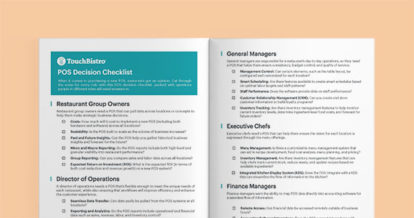Line cooks – also known as chefs de parties – are the linchpins of your back-of-house restaurant operations. They keep the kitchen running efficiently and feed your guests, all while facing the pressures of the kitchen.
Finding qualified staff is one of the most important components of running a restaurant, but it can also be the biggest struggle. This guide will help you find the most talented line cooks for your restaurant and teach you how to keep them happy.
In this article you’ll learn:
- What a line cook is
- What to look for when hiring a line cook
- How to retain quality cooks

What is a Line Cook?
Line cooks are the chefs responsible for operating a single station at a restaurant. Line cook stations are typically divided by type of food (such as butcher, fish, vegetable, etc.) or by preparation method (sauté, roast, grill, etc.).
Cooks are typically responsible for their stations from start to finish, from making sure the supplies are fresh to preparing ingredients to cooking. In larger restaurants, a line cook may have several assistants working under them.
The name line cook comes from the term “line,” which refers to the horizontal kitchen space set up that’s common in restaurants. In a restaurant, the phrase “on the line” means you are a working line cook. Other common names for the role are “chef de partie” and “station chef.”
Types of Line Cooks in a Restaurant Kitchen
In the restaurant world, pecking order matters.
The following is the brigade de cuisine, or restaurant hierarchy, for line cook positions. You’ll learn common types of line cooks, their French culinary names (which are often used in fine dining establishments), and their responsibilities.
Sauté cook (saucier): On top of sautéeing all dishes that need sautéeing (obviously), this person is also responsible for preparing the sauces that accompany those dishes, preparing hot appetizers, and (sometimes) preparing fish dishes. The saucier is the most coveted and esteemed line cook position.
Roast cook (rotisseur): On top of braising and roasting meats, this person is also responsible for preparing the sauces that accompany these dishes. At large restaurants, this may role may be broken down even further:
Fry cook (friturier): Responsible for frying dishes.
Grill cook (grillardin): Responsible for grilling dishes.
Butcher (boucher): Responsible for butchering – and sometimes breading – meats.
Fish cook (poissonnier): Responsible for butchering, creating sauces for, and cooking fish.
Appetizer cook (entremetier): Responsible for preparing soups, pastas, and vegetables, in addition to hot appetizers. This role is typically referred to as “vegetable cook” when there is no legumier (see below). At large establishments, it’s common to have also have:
Vegetable cook (legumier): At large restaurants, this person is responsible for preparing vegetables.
Soup cook (potager): At large restaurants, this person is responsible for preparing soups.
Pantry cook (garde manger): Responsible for preparing cold dishes such as charcuterie, salads, cold hors d’oeuvres, etc.
Roundsman, swing, or relief cook (tourant): Responsible for assisting various stations throughout the kitchen or filling in as needed.
Pastry chef (patissier): Responsible for preparing baked goods, pastries, and desserts. At large restaurants, the pastry chef will have a team consisting of:
- Baker (boulanger): Responsible for baking breads and cakes.
- Confectioner (confiseur): Responsible for making candies and small cakes.
- Cold dessert chef (glacier): Responsible for preparing cold and frozen desserts such as ice cream.
- Decorator (décorateur): Responsible for making and decorating cakes and decorative baked goods for display.
The types of cooks you need will depend on what kind of restaurant you have. A classic French restaurant may employ all of the above, while a restaurant with a smaller menu may have more limited kitchen staffing needs.
Line vs. Prep vs. Short Order Cooks
It’s a full-time job just to keep it all straight.
Since there are so many of them, job titles in the culinary world can get confusing – especially when the responsibilities overlap. Let’s clarify the differences between a line, prep, and short order cooks.
- Line cooks have more experience and responsibilities than prep cooks and short order cooks, and are therefore above them in the kitchen hierarchy.
- Prep cooks assist line cooks in preparing their stations and ingredients. A prep cook may make sauces, chop produce, and portion out ingredients so that a line cook can simply take the items over to their station.
- Short order cooks usually work at fast food restaurants and are responsible for making foods that don’t require much preparation or technical skill. Unlike line cooks, who focus on one station, short order cooks are versatile and are expected to work various stations.
Knowing the differences between cooks will help you attract the right talent for the role you’re trying to fill.

Chef vs. Cook
On top of confusing job titles, the words “chef” and “cook” are often used interchangeably, which can make it difficult to decipher the differences between their roles. Here’s a little primer on a chef vs a cook job description.
Traditionally, the title chef refers to someone who manages the back-of-house team. A kitchen could have several chefs, including the executive chef (chef de cuisine) and sous chef (second in command).
If a chef is responsible for managing the back-of-house team, cooks are responsible for the cooking. A kitchen’s cooks work together to execute the chef’s vision and prepare food for guests.
A quick way to remember:
Chef = Management
Cook = Execution
What to Look for When Hiring Line Cook
How do you reel in the best talent, hook, line, and sinker?
We’ll explain:
- How to craft the perfect job description with appropriate line cook responsibilities
- What to look for when hiring line cook
- How to retain great line cooks
How to Craft the Perfect Line Cook Job Description
Finding the most talented line cooks for your restaurant requires attracting the right candidates with a specific job description that outlines the necessary line cook duties and the ideal candidate’s qualifications.
Cook Job Description and Line Cook Responsibilities
The job of a line cook goes far beyond just cooking. Here are some line cook responsibilities you should include in the job description.
- Food safety and hygiene: Line cooks need to be able to maintain clean food stations to ensure food safety standards. Line cooks also work in tandem with your food safety management system to monitor expiration dates and inventory at their stations.
- Food preparation: If your restaurant doesn’t employ prep cooks, your line cooks will be responsible for preparing ingredients at their stations. This could include chopping ingredients, making sauces, or portioning ingredients into uniform serving sizes.
- Cooking: A line cook’s main duty is to cook the menu items that their station is responsible for. Beyond simply preparing the food by following your restaurant’s recipes, line cooks must prepare food in a consistent and timely fashion.
- Communication and teamwork: Line cooks are expected to communicate effectively with their team, manager, and front-of-house staff. They must be able to coordinate with other line cooks to make sure that meals come out warm, consistent, and on time. Line cooks are also expected to perform other duties asked of them by management.

Line Cook Skills and Qualifications
When listed on a job description, the following line cook qualifications and skills should help you attract and staff line cooks that fit your venue’s needs.
- Experience: Successful job postings for line cooks specify how much experience you expect your line cooks to have. Start with the phrase, “Previous experience cooking at a restaurant required,” and fine tune it from there. You could require candidates to have a certain number of years of experience, a degree from culinary school, or experience working in a certain type of restaurant (fine dining, etc.).
- Physical abilities: A line cooks work is physically active. Make sure candidates can stand for long periods of time, are able to lift heavy objects, and can bend over frequently to grab ingredients.
- Soft skills: A line cook’s success depends on so much more than their ability to cook. Listing some or all of these soft skills in your job listing will guide you to the right candidate:
- Works well under pressure and maintains a professional attitude
- Passionate about the mission of your restaurant
- Consistent in dish preparation, timeliness, and attitude
- Works quickly with few errors
- Organized and clean
An effective job description with clearly defined responsibilities will help you build a strong pool of qualified candidates and review their applications to find the right fit for the job.
What to Look for When Reviewing a Job Application for a Cook
From the resume to the interview to the reference check, there are a few key things to keep in mind when choosing line cooks for your restaurant.
What to Look for in a Resume when Hiring a Line Cook
A rospective candidate’s resume should indicate that they meet most of the requirements in your job description. But beyond the obvious, you should also look at:
- Length of time at previous jobs: If a candidate changes their job every few months, this could indicate a problem with skill, commitment, or attitude – or even all three.
- Specialization: Does the candidate specialize in a certain type of cuisine or station? A specialist may be a better fit for your restaurant if you specialize in a type of cuisine or fine dining. On the other hand, a generalist might be the right way to go if you need someone who can cover a variety of stations.
- Mobility: Has the candidate worked as a line cook for the past decade, or did they start as a dishwasher and move their way up the kitchen ranks? Job mobility shows an ambitious, hardworking employee, but it could also indicate someone who may have ambitions beyond your current employment needs, someone who may not want the role of a line cook for as long as you may need them. Will your restaurant support professional development and/or have room for promotions in the back of house? On the other hand, a candidate who has stayed in the same role for a long time may be complacent. Ask the candidate where they see themselves in five years, but also have a good sense of the response you’re looking for before you do.
Reading resumes will give you a basic understanding of a candidate’s aptitude and whether they can complete basic line cook tasks, but it’s not enough to determine whom to hire. You’ve got to be ready to go a little deeper.
What to Ask a Line Cook in a Job Interview
After you’ve selected the top candidates based on their resumes, you need to interview them to get a better idea of their skills, personality, and passion to narrow down your selection.
Not sure where to start? Here are some line cook interview questions to get you talking:
- Why do you want to work at my restaurant?
- Why did you leave your previous job?
- Where do you want to be in five years? What are your career goals?
- Tell me about a time you made a mistake at your previous job. How did you handle it?
- What’s your favorite part of cooking? Your least favorite?
- What kind of schedule are you looking for?
On top of some of these universal questions, ask each candidate specific questions related to their resume, previous experience, and the new job they’re applying for.
What to Ask References When Hiring a Line Cook
When you’ve decided to move on with a candidate or two, you’ll want to ask for references. Talking to a candidate’s references should help you confirm that you’ve made the right pick for the job – or reveal any red flags you may not have caught earlier in the interview process.
Talking to a previous manager at a restaurant will give you the most useful information. Here are some questions you should ask references:
- What is your relationship to the candidate?
- Can you confirm their employment, role, and salary?
- Why did they leave this job?
- What’s it like to work with them?
- Would you hire this candidate again? Why or why not?

On the Line: How to Retain a Line Cook with Experience
You’ve gone to a lot of trouble to hire a fantastic team – don’t risk losing them to the competition!
With high turnover rates costing the restaurant industry lots more money each year, you need to make an effort to stay ahead of the high turnover trends.
The good news? There are some simple things you can do to make your line cooks happy in their jobs, so that they stay on your team as long as possible.
- Competitive pay: Paying your staff competitively will keep them from looking for other opportunities. Online tools such as Payscale can give you insight into what your competitors are paying their line cooks.
- Great culture: Do your employees love their work or hate coming in? Creating and codifying a team culture will help keep your staff happy by setting precedents for good behavior.
- Consistent hours: Be respectful of your cooks’ time by providing them with consistent schedules. Consistency will help them plan their lives outside of the restaurant, which will make them happier, which will lead to better performance in the kitchen.
- Incentives and promotions: Create goals for your kitchen team to work towards by giving them opportunities for upward mobility and, in the short term, incentives for stellar performance.
- Training: By providing your cooking staff with professional development opportunities, they’ll be able to perform at their best level at your kitchen.
Use this knowledge, follow these tips, and you’ll be able to hire and retain the top line cooks in your city.
For more resources for hiring, check out:
Download your free employee handbook template
Sign up for our free weekly TouchBistro Newsletter







